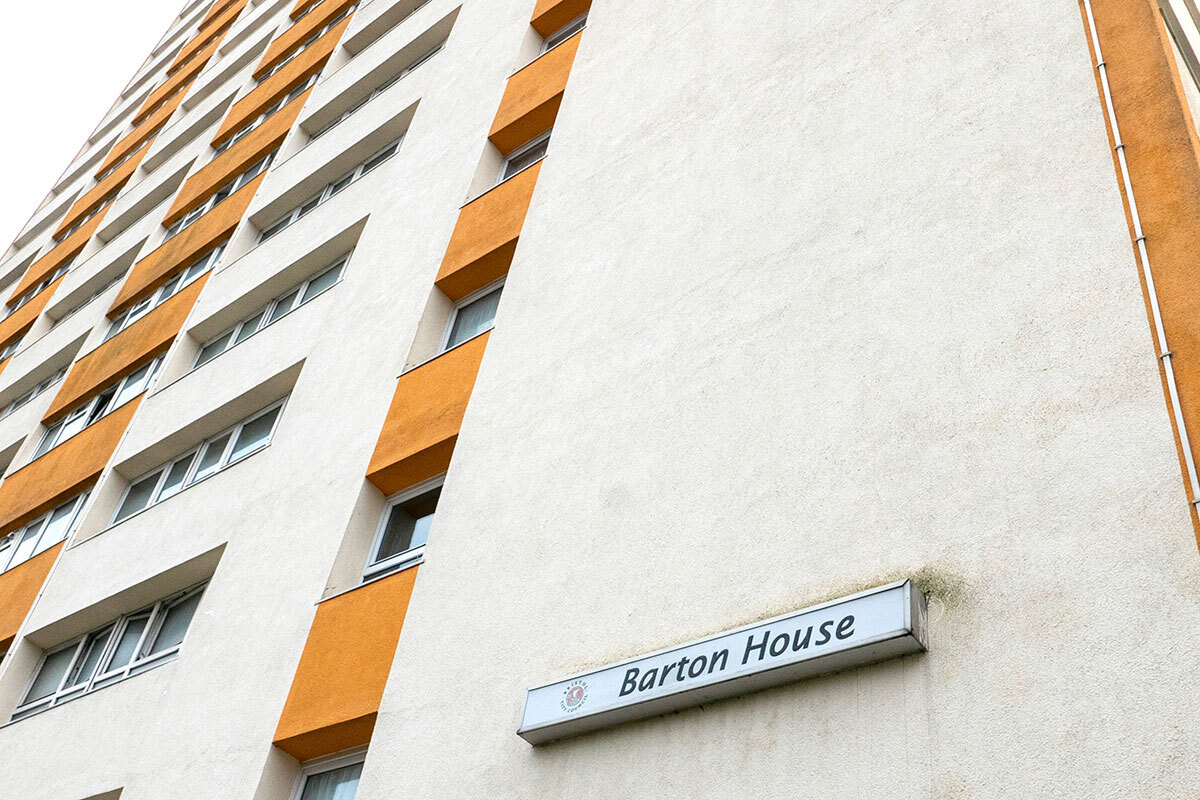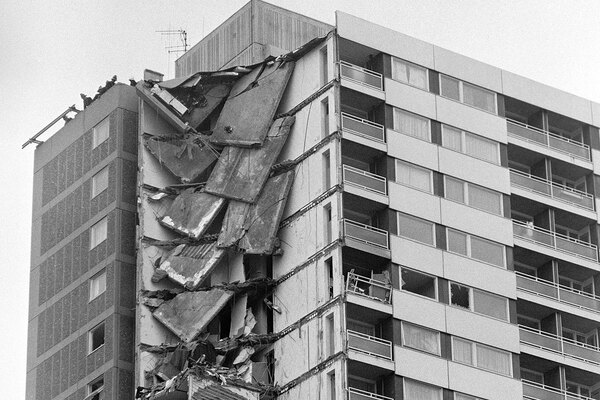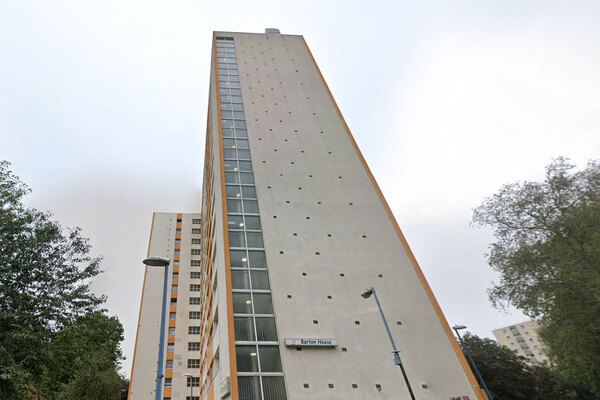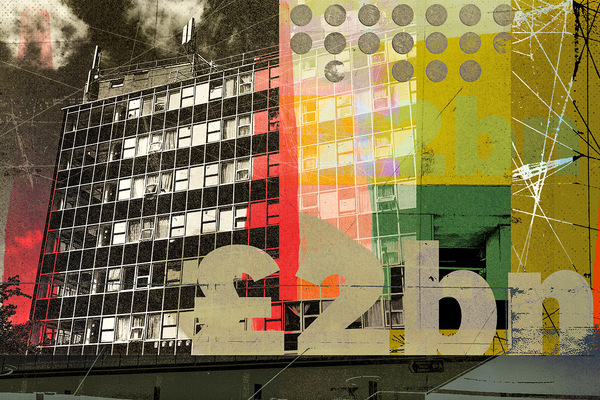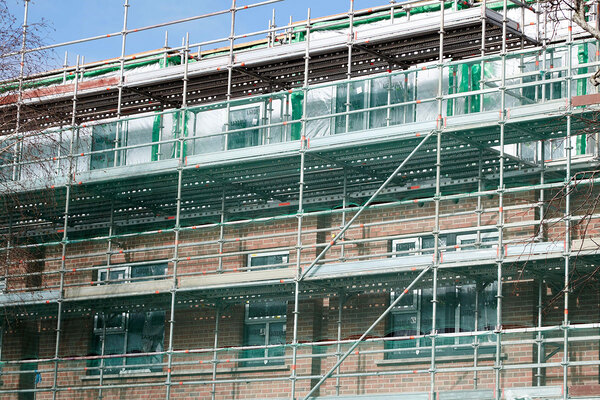Evacuation of Bristol high rise was ‘mass-traumatising event’, campaigners say
The evacuation of a high-rise council block in 2023 was a “mass-traumatising event”, campaigners have said.
A year on from the evacuation of Barton House in Bristol, residents have reported lasting mental and physical health impacts such as worsening respiratory disease, skin conditions and anxiety.
The residents’ claims emerged in a report published by Bristol Medact, a campaign group of healthcare professionals, and tenant union Acorn.
On 14 November 2023, more than 250 residents of Barton House were evacuated after being told their building was at risk of collapse.
Families spent the winter living in hotels until Bristol City Council moved them back into the building following repair works.
It later emerged that the council had been told in a surveyor’s report about structural issues at Barton House 15 months before the tower block was evacuated.
Medact, which based its report on interviews with nine households conducted in November 2024, said “it has become abundantly clear that the evacuation was a mass-traumatising event”.
Residents commonly reported anxiety, low mood and hypervigilance, a symptom commonly seen following traumatic events.
The physical health of residents has also suffered, with the researchers reporting evidence of worsening respiratory disease, skin conditions and “debilitating impacts on sleep and eating”.
During the evacuation in 2023, Medact argued, the lack of coherent communication from the council led residents to be “confused, misinformed and distressed”.
Residents then spent months living in “disused, unclean and overcrowded hotel rooms”. Many families were forced to share a double bed between three people, with others sleeping in makeshift camp beds or on the floor.
One resident told the group: “We were moved into dirty, dusty rooms which was initially only meant to be for three to seven days, but we ended up there for six months.”
Those with pre-existing conditions such as asthma reported worsening symptoms, especially among children.
Meanwhile, a number of infectious disease outbreaks and infestations were reported including norovirus, chickenpox and bedbugs.
One mother described how both her children had recurrent diarrhoea and vomiting, resulting in dehydration and three A&E attendances in one week.
Her 18-month-old daughter became non-verbal and her behaviour had changed, with her mother describing her as “a different child”. The child is now three years old and remains non-verbal, and is on the waiting list to be assessed for autism.
A single mother with rheumatoid arthritis had no fridge in her hotel room and so had to store her medication in the fridge in the restaurant downstairs. If the restaurant closed then she could not access her medication, causing “agony” for the mother and her children who watched her suffering but could do little to help.
With no help forthcoming from the council, fellow residents ended up fundraising between themselves to buy her a fridge.
Most families Medact spoke to described the food supplied in the hotels as “poor quality and often inedible”, leading to ongoing episodes of gastroenteritis.
Children and young people found it difficult to focus in school and complete homework after school, while parents were often forced to reduce their working hours to undertake extra childcare responsibilities.
By the end of February 2024, Bristol Council declared Barton House safe for return following surveys and structural repair works. However, many residents had lost trust in the council and its ability to provide them with safe housing.
Tower Blocks UK said the council had been “discriminatory and coercive” by aiming to “compel residents back”.
“They live in constant fear for their safety, worried about the prospect of fires and of the building collapsing,” the report said.
Fire alarms installed by the council following the return to Barton House also left residents feeling scared and reminded them of the evacuation.
One fire expert claimed that “too much is being assumed” in the surveys that allowed residents to return.
Campaigners noted: “The sense from many residents is that the poor treatment they have received has not been an accident and that it reflects the systemic racism entrenched in the national housing system.”
Medact has called for:
- Families who do not feel safe living in Barton House to be rehoused
- A public apology to residents of Barton House over the handling of the crisis
- Compensation to all residents for the distress and costs incurred from the evacuation
- An independent investigation into how Bristol Council handled the crisis
The report concluded: “Some residents should be rehoused, while others may choose to stay. We urge decision-makers to centre the dignity and humanity of residents by finally listening to them and giving them what they need to feel safe.”
In their foreword to the report, the Acorn members living in Barton House said they had been “through a nightmare” following their evacuation.
“Communication from Bristol City Council leaders was inadequate, temporary accommodation undignified and unsafe, and we have many questions about why our block’s structural issues were not addressed earlier,” they said.
Bristol Council said in November it was looking at creating a new standalone housing department after it was handed a non-compliant C3 grade for consumer standards by the Regulator of Social Housing.
Medact will present its findings to the council at a meeting on Wednesday 26 February.
Barry Parsons, chair of the homes and housing delivery committee at Bristol City Council, said: “I was at Barton House during the evening of the evacuation and visited families who had to leave their homes in the weeks afterwards, so I saw first-hand some of the shock and distress that residents felt. That’s why I’ve commissioned the service to review the rehousing options for people who have been affected.
“The council takes its duty of care to residents very seriously, and we endeavour to support the residents of Barton House where we can. Our priority remains to ensure that the health and wellbeing of all residents living in council housing is supported and we are living up to our promise to ensure they live in safe and decent homes.
“We acknowledge the report, and its contents, published today (26 February) and thank Medact Bristol for the work they have done with Barton House residents and Acorn.
“Over the coming weeks we will take time to consider and reflect on the conclusions and recommendations of the report ahead of issuing a formal response by the end of March and updating residents on the actions we will take as a result.”
Sign up for our fire safety newsletter
Already have an account? Click here to manage your newsletters
